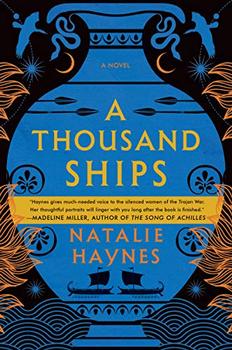Summary | Excerpt | Reading Guide | Reviews | Beyond the book | Read-Alikes | Genres & Themes | Author Bio

Troy has fallen and Rome is a tiny village by the seven hills. Lavinia, daughter of a local king, has lived in peace and freedom until suitors come seeking her hand, and a foreign fleet sails up the Tiber. Now, she tells the story Vergil left untold - her story, her life, and the love of her life.
Troy has fallen. Rome is a tiny village by the seven hills... At the end of Vergil’s epic poem The Aeneid, the Trojan hero Aeneas, following his destiny, is about to marry the Italian girl Lavinia. But in the poem, she has played only the slightest part, and has never spoken a word.
Daughter of a local king, Lavinia has lived in peace and freedom, till suitors came seeking her hand, and a foreign fleet sailed up the Tiber. Now her mother wants her to marry handsome, ambitious Turnus, but strange omens, prophecies spoken by the voices of the sacred trees and springs, foretell that she must marry a stranger. And that she will be the cause of a bitter war. And that her husband will not live long.
Lavinia is determined to follow her own destiny. And when she talks with the spirit of the poet in the sacred grove, she begins to see that destiny. So she gains her own voice, learning how to tell the story Vergil left untold — her story, her life, and the love of her life.
When thinking of the epics that tell the tales of Odysseus, Achilles and Aeneas, grand scenes come to mind. Characters are larger than life, battles are loud and bloody, and the gods are an ever-present influence over the fortunes of their heroes. If the reader approaches Lavinia with these expectations, they will be disappointed. It's not an epic; it's a quiet tale, small and contained. It tells of the things that would have concerned the women of that time – tending to the hearth and performing home rituals, caring for their children, ministering to the wounded in battle -- common, mundane matters. Battles happen in the background for the most part. There are no marble-columned palaces here; what action there is takes place in a rural community.
The reader's expectations may also be distorted by a well-publicized review by Publishers Weekly comparing Lavinia favorably to Robert Graves's I, Claudius. Any parallel that reviewer saw between the two novels is unclear, as the books aren't remotely equivalent. I, Claudius provides a sense of epic history; Lavinia reads more like a diary. Anyone selecting Lavinia based on an assumed similarity with I, Claudius will almost certainly be dissatisfied with it ....
Lavinia's strength is the depth of Le Guin's imagination. Lavinia is a fully fleshed out character. The novel is rich with detail, and Le Guin's scholarship evident. It won't be for everyone, but readers who take pleasure in learning what day-to-day life was like in a distant era will find Lavinia worth their time...continued
Full Review
 (511 words)
(511 words)
(Reviewed by Kim Kovacs).
History records that Publius Vergilius Maro, better known as Vergil (or
Virgil), was born in 70 BCE. Scholars argue about his place of birth and
his early education, but legend has it that he was born the son of a farmer in Northern Italy, which
was then known as Cisalpine Gaul ("Gaul, on this side of the Alps").
Despite a relatively lowly birth, he was well-educated, ending his education in Rome
where, after dabbling briefly with other studies, he focused on philosophy.
Vergil lived during one of the most turbulent times in history. He was ten years old
when the First Triumvirate (Julius Caesar, Pompey and Crassus) was formed, 17
when it collapsed, and 26 when Caesar was assassinated in 44 BCE. He fled south
to Naples ...

If you liked Lavinia, try these:

by Lev Grossman
Published 2025
The #1 New York Times bestselling author of the Magicians trilogy returns with a triumphant reimagining of the King Arthur legend for the new millennium.

by Natalie Haynes
Published 2021
Shortlisted for the Women's Prize for Fiction, a gorgeous retelling of the Trojan War from the perspectives of the many women involved in its causes and consequences - for fans of Madeline Miller.